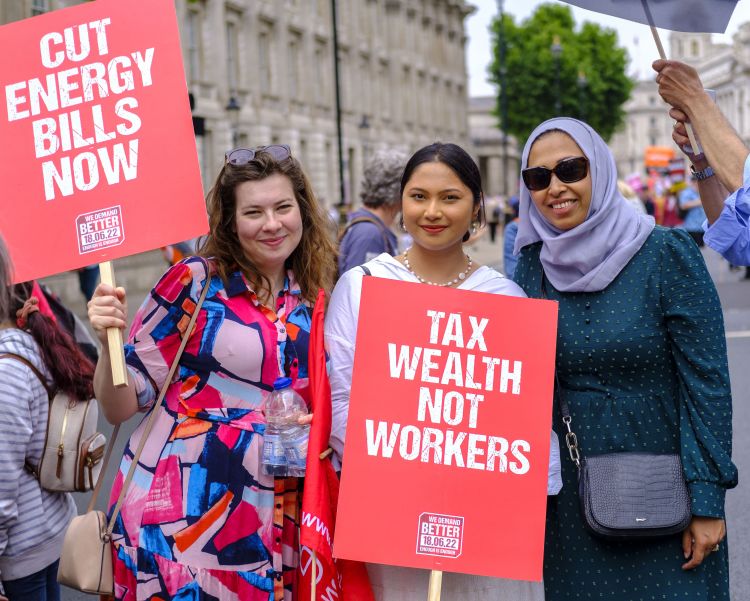General Council Report 2022
TUC mission statement
The TUC brings together more than five million working people who belong to our 48 member unions. We support trade unions to grow and thrive, and we stand up for everyone who works for a living. Every day, we campaign for more and better jobs, and a more equal, more prosperous country.
Introduction - Frances O'Grady

Working people are in the midst of a cost-of-living emergency. Inflation is at a 40-year high and millions of families are struggling to keep their heads above water. Shamefully, workers once lauded by ministers as pandemic heroes, now rely on debt or food banks to get by. As top pay, profits and shareholder dividends soar, our number one priority as trade unionists is to win a fair deal for workers.
Global hikes in food and energy costs – not wages – are driving rising prices. But this crisis is also made in Downing Street. Had our wages just kept pace with the OECD country average since the financial crash, UK workers would now be earning an extra £4,000 a year. But over a decade of Conservative austerity, benefit cuts and weak rights at work have hammered families’ financial security. The government has no plan to tackle the crisis or the UK’s sorry record on investment in skills, productivity and the transition to net zero.
Boris Johnson promised ‘a high wage economy’ but instead his political choices have seen pay packets, and the share of total wealth created going to workers, shrink.
But while the government wages divisive culture wars in a desperate attempt to distract from its own failings, trade unions are stepping up to the plate. In June, tens of thousands joined the TUC’s We Demand Better national demonstration, calling for action on the cost of living, stronger rights and a new deal for workers. The protest in London, and town hall meetings around the country, marked the launch of a programme of action to fight back.
The TUC is demanding a higher minimum wage, fair pay agreements – starting with social care – and a decent pay rise for all workers. While ministers partied, key workers put their health on the line to care for us. It’s time we cared for them. And everyone who works for a living deserves fair rewards. We’re also fighting for a greener, fairer and more equal economy with a boost to universal credit, more collective bargaining and tax hikes on wealth – not workers. It’s time to level the playing field for the real wealth creators.
With prices rising much faster than wages, we’ve seen an upsurge in industrial action. Nobody takes strike action lightly but when employers won’t negotiate, workers are left with no choice. Hundreds of thousands of workers have voted to take industrial action to win a fair deal. The TUC‘s new Solidarity Hub is helping unions to boost democratic participation in ballots and step up support from the whole movement and our communities too.
We’re also demanding better work. The scandal at P&O Ferries – where the permanent crew, paid the union rate for the job, were unlawfully sacked and replaced by agency labour on poverty pay – met widespread condemnation. But despite promising more than twenty times to bring forward an employment bill, ministers have not lifted a finger to strengthen workers’ rights. The TUC’s call for a ban on fire-and-rehire, zero-hours and false self-employment, in favour of positive flexibility so workers can balance work and family life, has won popular support. And we’ll resist any attacks on EU-derived rights, as the government sets its sights on so-called burdens from Brussels. When government wants people to work even longer and harder for less, it’s high time to say enough is enough.
Thanks to the success of the NHS vaccination programme, life is gradually returning to normal for many. But it’s not over yet. The TUC is campaigning for those suffering from long Covid and for those who are clinically vulnerable. And the resilience of our overworked public services could be tested again by new variants. Lessons must be learned. Together with the Covid-19 Bereaved Families for Justice and other allies, the TUC succeeded in its campaign for an independent public inquiry into the government’s mishandling of the pandemic. Unions are at the forefront of the fight for investment in public services, the priority of people over profit and stronger health and safety at work. We are also organising to end the structural racism that saw Black and minority ethnic workers more likely to be employed on insecure contracts in overcrowded workplaces with poor ventilation, to miss out on proper PPE, and to suffer ill-health and die.
With Covid-19 shining a light on terrible injustices in our society, equality remains a central focus for the TUC. We continue to expose the causes, and consequences, of the barriers facing disabled workers, LGBT+ workers and women – including the scourge of sexual harassment. Meanwhile, our Anti-Racism Task Force will present a manifesto to Congress, including recommendations on organising, bargaining, policy and campaigns, and the imperative that unions lead by example. Diversity is strength.
As the terrible war in Ukraine drags on, our commitment to internationalism, solidarity and peace is more important than ever. Trade unions have campaigned for rights to safe routes and asylum for all people fleeing conflict, rape and persecution. We’ve highlighted how the global poor are suffering most from food shortages resulting from the war. We’ve worked with trade unions globally to counter the threat of the radical right and fascism. And around the world, from Brazil to Colombia, Turkey and Palestine, we’ve championed the cause of working people and their unions.
This is my final Congress as TUC general secretary. I’m proud to have spent my working life serving the cause of organised labour. Whatever our background, at its heart trade unionism is all about friendship between working-class people. And the comradeship, courage and resilience of our reps and officers is second to none.
Next year will be a crucial year for our movement. Let’s encourage each other, stay strong and organise for our future. Keep the faith and we will win for working people.
Solidarity,
Frances O Grady

Introduction
TUC work to support union reps to develop the knowledge to challenge employer and government responses to Covid remained a high priority throughout the year. Webinars, guides and tools for reps were popular.
Our focus also shifted to the longer-term impacts of Covid and we continue to campaign for long Covid to be formally accepted as an industrial illness and disability in line with resolution 8. And, along with our affiliates, we will be playing a full role in holding the government and its agencies to account for how the coronavirus pandemic developed via a public inquiry.
Health and safety
The TUC campaigned to ensure that the health, safety and welfare of workers is protected by strong union organisation and a growing network of health and safety reps with access to high-quality guidance and advice. We produced a range of resources to support workplace activists; webinars focused on ventilation, working in extreme temperatures, the safety of pregnant workers and lone workers.
In response to composite 1, the TUC has called for Covid and long Covid to be recognised as an industrial disease and a disability, publishing evidence on the link between Covid-19 infection and fatality with certain occupations, surveying thousands of workers with long Covid on their experience in work. We joined the call for universal access to occupational health services, supporting the Society for Occupational Medicine’s campaign. In support of composite 1, we launched a new training course, From Resilience to Resistance: organising on work-related stress.
Responding to resolution 45, the TUC launched work focusing on the health and safety of Black workers. A roundtable of Black union leaders, activists, safety reps and union health and safety leads informed a research project, comprising focus groups and surveys of workers. Similar work encouraging women to take on the role of safety reps has begun, following resolution 48, with research aimed at understanding the barriers women experience and the safety issues that intersect with gendered experiences of work.
We continued our call and campaign for Statutory Sick Pay to rise to the real living wage, and to be made available to all workers, in response to resolution 23. Reflecting composite 7, the TUC campaigned for and secured strengthened health and safety rights for pregnant women, challenging the Health and Safety Executive’s employer guidance and forcing an update: all employers must now conduct individual risk assessments for pregnant workers.
The Union Health and Safety Specialists network met throughout the year. This forum discussed developments within occupational health and safety and shares best practice and issues of concern.
In the run-up to International Workers’ Memorial Day in April 2022, the TUC focused on the requirement for safety regulation to be included in the Covid-19 public inquiry, in response to composite 9.
We have continued in our call for the strengthening of regulatory bodies, and for more funding to the cash-strapped Health and Safety Executive.
The TUC continued in the role of Secretariat to the All-Party Parliamentary Group (APPG) on Occupational Health and Safety and the Sub-Group on Asbestos, engaging with parliamentarians and sector organisations on a range of issues and campaigns. This year the APPG co-sponsored research into asbestos presence in public buildings, with members providing political support in parliamentary questions, motions and in the media.
Claire Sullivan from CSP and Ged Nichols from Accord continue to serve as employee representatives on the board of the Health and Safety Executive (HSE). The DWP has not filled the third trade union seat since Kevin Rowan left the board in October 2021
The Covid public inquiry
The Covid-19 inquiry has been set up to examine the UK’s preparedness and response to the pandemic, and to learn lessons for the future. With the publication of the final terms of reference in June 2022, the independent inquiry has now been formally established under the chair of Baroness Hallett.
The TUC has confirmed that it will apply for core participant status in the public inquiry as the representative body on behalf of all affiliated unions, as the most effective way of securing a broad range of trade union engagement in the inquiry while optimising resources.
If granted, the TUC would act as a conduit to affiliate union engagement in the inquiry, with unions playing the lead role in the relevant parts of the inquiry. The TUC itself would engage on its own terms in those parts of the inquiry directly relevant to its own role in the pandemic.
As a representative body core participant, the TUC would ensure fair, balanced and inclusive engagement of affiliates across sectors. We have set up a working group of unions to inform the TUC’s approach as the inquiry progresses. We will consult with our statutory committees to ensure the voice of members disproportionately impacted by the pandemic, particularly women, BME and disabled workers, are centred in all work around the inquiry.
Working in partnership with our legal representatives – Caoilfhionn Gallagher QC of Doughty Chambers and Thompson’s Solicitors – and through our trade union working group, we have to date focused on engaging with the consultation on the terms of reference, a key stage in the process.
The TUC will continue to liaise with unions, through the working group and TUC committees, focusing on assembling evidence for the inquiry to look at:
- the impact of the pandemic on members in workplaces
- identifying the contributing factors – government policy, legal framework, inspection and enforcement and employer behaviour (at a corporate, sectoral or workplace level)
- the supporting evidence available – what we can utilise and who is best placed to represent that to the inquiry
- what change we aim to achieve in respect of government policy, the legal framework, inspection and enforcement and employer behaviour.
Stay Updated
Want to hear about our latest news and blogs?
Sign up now to get it straight to your inbox

